Skift Take
The nature of engagement has changed profoundly. At EventMB's The Future of the Event Industry: 2022 Outlook Summit, event professionals joined us to explore how the industry has metabolized lessons from the pandemic and what that means for events in 2022.
Spring is just around the corner, and with it comes the hope that we are heading out of the pandemic. In many parts of the world, in-person events are returning — ushering in a new phase for the event industry. While there is still a lot of uncertainty about what we can expect this year, some clear trends that emerged in the Covid context seem likely to stick around and continue to be influential.
Many of the 11 Trends to Watch, summarized below, show the results of event professionals metabolizing what they have learned and developed in order to host events under Covid-related constraints. Necessity, it has been said, is the mother of invention, and many of the processes, tech, and frameworks invented to solve problems in 2021 have led us to discover new ways of connecting and engaging with each other. These innovations will drive the continuing evolution of event planning this coming year.
No matter what the future holds pandemic-wise, it is certain that 2022 will be another year of intense transition for event professionals. To help you stay prepared, let’s look at some of the insights that emerged during EventMB’s The Future of the Event Industry: 2022 Outlook Summit (FEI 2022).
If you missed the summit and want to go deeper into these insights, check out Event MB’s on-demand recording of the event here.
Uncertainty Still Impacts Planning and Budgets
When polled, attendees of the EventMB 2022 summit overwhelmingly reported that they were following data about Covid infection rates to help plan future events, with about 30 percent staying on top of local numbers and nearly 50 percent following Covid information both locally and worldwide.
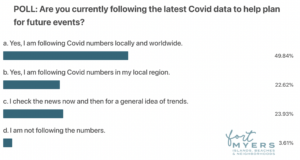
But following numbers may not always be enough to have a handle on future likelihoods. Michael Dominguez, president and CEO of ALHI, emphasized that understanding the data is crucial — which involves knowing what data is relevant. Staying objective will be important for clear-eyed planning, especially for complex or larger-scale events that require locking down vendors well in advance. For all these reasons, the management of Covid-related risks will continue to influence event budgets.
The secret to doing so successfully, Dominguez says, is to extrapolate what Covid data shows now in order to make an informed prediction about what the public health contexts may be on the upcoming event: “The reason [Wayne Gretzky] was great is that he skated to where the puck was going to be, not to where the puck was.”
Dominguez predicts that there will be an overcorrection pushing people towards more in-person events as soon as it’s safe enough to gather at large scales. Already, he notes, “Meeting planners are struggling to find meeting space across the board,” especially in second-tier cities. Metro areas have not yet seen the same degree of saturation, and so it’s possible that for the near term, it may actually be easier to find space in major cities as opposed to some of the smaller destinations.
Event Platforms to Host Online Communities
Just over 40 percent of FEI 2022 poll respondents indicated that they either already had thriving event communities or were beginning to build them. A further 29 percent said they had plans to build them. As these results suggest, pandemic-related advancements in digital event platforms have opened up a powerful new tool for building and managing event-specific, evergreen digital communities.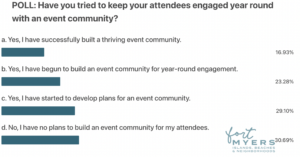
Nolan Ether, content marketing leader at Socio, spoke at FEI 2022 to offer tips on how to get started. “We should have been building communities all along,” Ether argues, pointing out that an event planner doesn’t need to rely exclusively on event platforms for their community building efforts. There may be relevant online networks on sites like LinkedIn that event planners can tap into to build engagement. “Putting yourself out there” and approaching existing communities can build trust and connections that translate into continued engagement through the event platform during and after the event. The advantage of the event platform, he says, is that it allows event organizers to truly own the space.
Virtual Will Still Influence Experience Design
Hugh Forrest, the chief programming officer for South by Southwest (SXSW), shared his experience of pivoting to a fully virtual festival in 2021 after having to cancel in 2020 entirely. One upside of holding the event virtually was that physical capacity constraints did not affect attendee access to popular events. Additionally, the ease of navigating from one event to another virtually made it possible for people to take in more content based on their individual interests, more so than if they had to move physically from venue to venue for an event as large as SXSW.
However, Forrest did describe challenges in getting that content to attendees, particularly for live broadcast events. “The lesson there is that we should have just done everything prerecorded,” he notes — though that may not always be possible for hybrid events, where the remote audience may want to share the live experience with in-person attendees. As recording event methods become more refined, hopefully these challenges will become easier to overcome.
In Forrest’s experience, integrating online and in-person communities at events remains challenging. Forty-two percent of the Future of the Event Industry summit audience believe virtual events will be important in a post-Covid world, and 29 percent believe they will continue to be very important — so we can expect that these frictions will continue to push experience design into new territory this year.
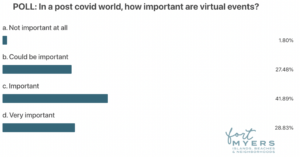
Associations Step Up Member Engagement Efforts
In a robustly competitive information environment, associations have had to get creative to retain the attention of their members during the pandemic. Sheriff Karamat of PCMA and Senthil Gopinath of ICCA have different focuses: PCMA serves individual members while the ICCA offers corporate memberships — but both agreed that the best way to broaden their associations’ horizons is to understand where their members are coming from.
The most effective approach for PCMA, Karamat explained, is to recognize that “the reality is that you have to meet your customers where they’re at, not where you want to be.” One of the ways PCMA accomplishes this is by embracing both members and non-members across their various channels: While some might need the specialized services they can only get from membership, non-members can still benefit from participation in PCMA’s online community. This “two lane” approach is helping PCMA to grow its audience exponentially, according to Karamat.
Though ICCA serves members exclusively, Gopinath agrees with the general principle, asserting “value creation is all about the experience, so we are constantly deep diving to see what is the best experience you can create.”
When asked what the biggest value-add offered by associations to members was, 50 percent of the Future of the Event Industry’s audience identified professional development resources and training, 38 percent chose networking, and 11 percent selected educational content.
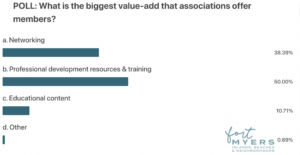
Intentionally responsive associations can be well-positioned to deliver the kinds of value-adds that association members are looking for. In a post-pandemic world, it will continue to be vital to augment association deliverables with digital channels and predict members’ needs to offer them the right choices. As Karamat points out, “If our events are not going to deliver what our audience is looking for, they are going to go elsewhere.”
Agile Event Planning Is Now the Gold Standard
Jennifer Kellogg, VP of operations for MeetingPlay, spoke with EventMB editor in chief Miguel Neves about how the need to pivot rapidly will continue to drive agile event planning as a professional standard. “Staying agile isn’t just about being able to react quickly, which planners do very well. It’s also about thinking and understanding thoroughly every aspect of the event.”
Hybrid and virtual components of events are here to stay, with 51 percent of attendees at the Future of the Event Industry 2022 believing that they will primarily be using hybrid event formats in Q3 and Q4. To harness the technological innovations of the last year and meet the challenges of this change in work culture, Kellogg urges event planners to ensure that they pair the strategic goals of the event with the right hybrid and virtual applications. In other words, agility is best achieved when the client’s goals are front and center during every aspect of planning.
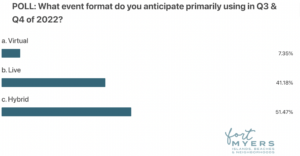
Event Agencies Rethink Value-Adds and Services
Fiona Bruder, president at Americas and GPJ, Steve O’Malley, the enterprise vice president & COO at Maritz Global Events, and Oscar Cerezales, the chief strategy officer at MCI Group, joined the 2022 EventMB summit to discuss how event agencies have evolved during the pandemic.
“There are no new trends,” Cerezales opines. “Covid just accelerated all the trends.” However, the pandemic did make it necessary for agencies to field test remote and hybrid solutions and iterate on the run. Bruder described how the pivot to virtual led to GPJ developing new capacities for content production: ”We really invested heavily in digital broadcast content development to make sure that the quality came to life.” O’Malley added that Maritz took the opportunity to test out what works and what doesn’t, noting that they “have refined what we’re offering in that space” as a result of what they’ve learned.
Event agencies have also found themselves mediating between clients and vendors, developing new models of shared risk. Changing revenue and cost realities are, in turn, changing the way agencies allocate resources, as well as their own core missions. Upskilling and offering higher-tier value-adds like conceptual planning have already changed the way that agencies interact with clients and vendors alike, and it appears that they are moving in the right direction: When asked if agencies are more or less relevant in a post-Covid world, 36 percent of summit attendees responded, “The same,” and 56 percent responded “More.”
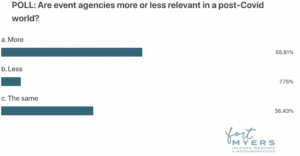
Event Tech Puts Shared Experience First
“High quality content can no longer be an afterthought,” Devin Cleary, VP of global events at Bizzabo, asserted during the Future of the Industry 2022. “The quality of video production ultimately affects an attendee’s respect level for your brand and your company.” As the technology develops, there is a growing expectation that event planners will utilize tech solutions to allow attendees a high degree of personalization, enhancing the value of their experience by ensuring that the content they connect with is convenient to access and directly meaningful.
Cleary emphasizes that for many attendees, virtual or remote presentations actually remove barriers to authentic engagement. As event profs digest the experiences of 2021, he’s excited to see how the industry will mobilize new functionalities to create virtual experiences that go beyond acting as a stand-in for in-person interaction.
Trade Shows Return to In-Person
There has been a lot of speculation that pent-up demand for in-person experiences will drive strong attendance as health restrictions relax, but attendees at Future of the Event Industry 2022 offered some concrete insight into what’s to come. When asked, “What is your level of interest in attending industry events compared to a pre-Covid pandemic?” 27 percent responded, “More interested,” 50 percent expressed “The same level of interest,” and 17 percent said they are now less interested than before.
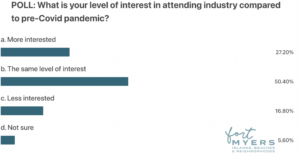
Trade and industry shows have faced unique challenges in the last 23 months that event tech platforms have not yet been able to fully overcome. Carina Bauer, CEO of IMEX, emphasized that the return to in-person shows will overcome the difficulty she has diagnosed in forging new trade-based relationships in virtual environments. The lack of sensory encounters with products is a serious hamper to what many clients want to communicate during trade shows, which, in turn, undermines attendee engagement. As a result, David Adrian, CEO and partner at ExpoDevCo, explained, “The digital events, quite frankly, are not satisfying customers… Getting people back together again is more than just a nice thing to do – it’s a necessary thing to do.”
Values Offer New Compass for Event Marketing Strategies
The use of data analytics to understand attendee needs and gauge ROI has become a common practice for event profs and their clients. Often this data is sorted according to demographic information, but, according to David Allison, that’s all wrong: “These stereotypes that we rely on when we look at the world through a demographic lens are not accurate, and our data proves this.”
Allison is the visionary behind “valuegraphics.” As opposed to demographics, which sorts people using categories like age, education level, and ethnicity, valuegraphics works with 56 core human values that Allison and his team identified after analyzing survey data from 750,000 respondents globally. The idea is that valuegraphics tell much more about a person (and what motivates them) and therefore is a more effective tool for targeting event marketing and producing spot-on content for attendees.
Innovations in the social sciences will become more influential as more and more event agencies and planners provide strategic guidance and conceptual planning as value-adds to their clients.
Events Goals and Audience Needs to Drive Strategy
Event profs have many tools now, both for digital and in-person contexts — many will be using a range of tools from both benches for the same client and often for the same event. Plotting a primary event strategy will require having a very clear lock on the event purpose to make sure the mode of content delivery engages attendees effectively.
Ben Chodor, president at Notified and author of Transitioning to Virtual and Hybrid Events: How to Create, Adapt and Market an Engaging Online Experience, told the Event MB 2022 summit, “You need to really reorganize — reinvent — what your strategy is for an event, and don’t just lump in digital and physical together, because they’re not one. Each is a different experience for your audience.” Being able to stay connected with audiences through their preferred content is an effective way to combine the strengths of digital and in-person components of an event. Chodor continues: “I think it builds a better user experience for the physical and the virtual audience, and I think your sponsors and your organization gets the most out of it when it’s thought of in that way.”
Events Fill Need for Remote Work Connections
Caleb Parker, the founder of Bold, put it clearly: “The office no longer has a monopoly on work.” The decentralization of work was already a trend that the pandemic accelerated exponentially, making it a common reality in many workplaces. This opens up a new need that creates new opportunities for event profs, as Anh Nguyen, head of community engagement at twine, told attendees of the summit: “Companies are hiring what they are calling the director of remote work, where their whole job is basically to ensure that remote employees are feeling connected, they have experiences that make them feel like they belong… We already have the expertise across our industry to help with this.”
Remote and hybrid work has created new workflows and processes that will powerfully influence the future of work. Even as restrictions lift, many employers and associations may choose to continue to implement remote and hybrid environments because of the enhanced access to talent that they make possible; 72 percent of the attendees of the summit identified “flexible” as their preferred working arrangement. More and more employers are beginning to consider how to design work experience to facilitate productivity and talent retention, and part of this is a trend to use event tech to facilitate internal meetings and experiences.
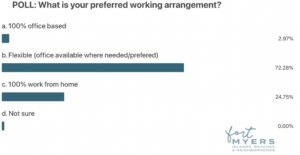
CONCLUSION
We will be interested to see how experience design in workplaces will intersect and cross-pollinate with expertise coming out of the lessons the event industry has learned in the last few years.
The tools event planners can bring to the table have changed. Innovations of both tech and planning processes may have emerged in response to the specific situation of a global pandemic, but the toothpaste is not going back into the tube. Hybrid and digital content, on-demand and 365 audience engagement, and highly agile planning will be industry gold standards even after the pandemic has subsided.
To dig deeper into these trends, or to hear more from a particular speaker during EventMB’s The Future of the Event Industry: 2022 Outlook Summit, access the on-demand version of the event here.





